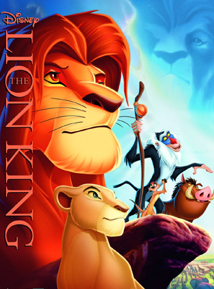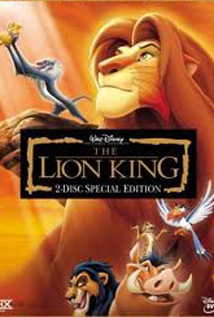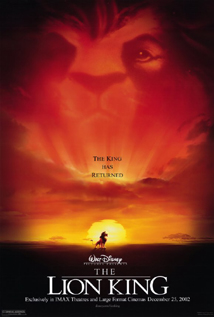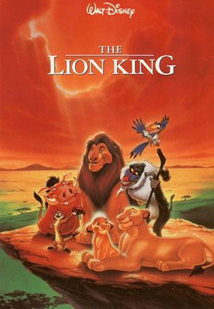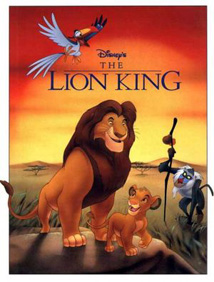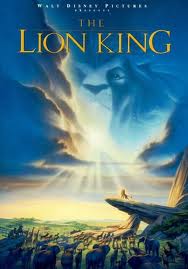The Film
The Lion King was produced by Walt Disney Feature Animation in 1994, and released by Walt Disney Pictures. It is the 32nd feature in the Walt Disney Animated Classics series. The film was produced during a period known as the 'Disney Renaissance'.
The story takes place in a kingdom of anthropomorphic lions in Africa, and was influenced by the Bible tales of Joseph and Moses, the Epic of Sundiata, and the William Shakespeare play Hamlet. The Lion King was directed by Roger Allers and Rob Minkoff, written by Irene Mecchi, Jonathan Roberts and Linda Woolverton and produced by Don Hahn. It starred a range of actors and actresses who voiced the parts, including Matthew Broderick, Jeremy Irons, James Earl Jones, Rowan Atkinson, and Whoopi Goldberg.
The Lion King won two Academy Awards, for Best Original Score (by Hans Zimmer) and Best Original Song with "Can You Feel the Love Tonight" by Elton John and Tim Rice. It also won.two Golden Globes, for Best Motion Picture - Musical or Comedy and Best Original Score.
Story development
The idea for The Lion King started in late 1988 during a conversation between Jeffrey Katzenberg, Roy E. Disney and Peter Schneider. In November of that year, Thomas Disch (author of The Brave Little Toaster) wrote a treatment, entitled King of the Kalahari, and, in the following year, Linda Woolverton produced the first draft of the script, which was entitled King of the Jungle and drew much inspiration from Hamlet.
George Scribner was the initial director of the film, being later joined by Roger Allers, who was the lead story man on Beauty and the Beast in October 1991. Allers brought with him Brenda Chapman, who would become the head of story. After six months of story development work, Scribner decided to leave the project, as he clashed with Allers with his intention of making a documentary-like film more focused on natural aspects, and also disagreed on turning the film into a musical. Rob Minkoff replaced Scribner, and producer Don Hahn joined the production. Hahn found the script unfocused and lacking a clear theme, and, after estabilishing the main theme as 'leaving childhood and facing up to the realities of the world', asked for a final retool. Allers, Minkoff, Chapman and Hahn then rewrote the story with directors Kirk Wise and Gary Trousdale, who had just finished Beauty and the Beast. The script also had its title changed from King of the Jungle to The Lion King, as the setting was not the jungle but the savannah.
During the summer of 1992, the team was joined by screenwriter Irene Mecchi, with a second screenwriter, Jonathan Roberts, joining a few months later. Mecchi and Roberts took charge of the revision process, fixing unresolved emotional issues in the script and adding further comedy scenes .Lyricist Tim Rice worked closely with the writing team, as his songs needed to work in the narrative continuity, and the lyrics were even pinned to the storyboards during development.
Don
Hahn said:
"The Lion King was considered a little movie because we were
going to take some risks. The pitch for the story was 'a lion cub
gets framed for murder by his uncle set to the music of Elton John'.
People said, 'What? Good luck with that.' But for some reason, the
people who ended up on the movie were highly passionate about it
and motivated." Most of the leading animators were either doing their first major work supervising a character, or had much interest in animating an animal. Thirteen of these supervising animators, both in California and Florida, were responsible for establishing the personalities and setting the tone for the film's main characters. The animation leads for the main characters included Mark Henn on young Simba, Ruben A. Aquino on adult Simba, Andreas Deja on Scar, Aaron Blaise on young Nala, Anthony DeRosa on adult Nala, and Tony Fucile on Mufasa. Nearly 20 minutes of the film, including the "I Just Can't Wait to Be King" sequence, were animated at the Disney-MGM Studios facility. Ultimately, more than 600 artists, animators and technicians contributed to The Lion King over the course of its production. The character animators studied real-life animals for reference, as was undertaken for the 1942 Disney film Bambi. Jim Fowler, renowned wildlife expert, visited the studios on several occasions with an assortment of lions and other savannah inhabitants to discuss behaviour and help the animators give their drawings an authentic feel. During pre-production in 1991, several of the lead crew members, including the Allers, Scribner, Hahn, Chapman, and production designer Chris Sanders, had taken a trip to Hell's Gate National Park in Kenya, in order to study and gain an appreciation of the environment for the film. The Pride Lands are modelled on the national park. Since the characters were not antropomorphised, all the animators had to learn to draw four-legged animals, and the story and character development was done through usage of longer shots following the characters. The use of computers helped the filmmakers present their vision in new ways. The most notable use of computer animation is in the "wildebeest stampede" sequence. Several distinct wildebeest characters were created in a 3D computer program, multiplied into hundreds, cel shaded to look like drawn animation, and given randomised paths down a mountainside to simulate the real, unpredictable movement of a herd. Five specially trained animators and technicians spent more than two years creating the two-and-a-half minute stampede sequence. Other usages of computer animation were undertaken through CAPS, which helped simulate camera movements such as tracking shots, and was employed on the colouring, lighting and particle effects. The enthusiastic audience reception to an early Lion King film trailer, which consisted solely of the opening sequence with the song "Circle of Life", suggested that the film would be very successful. While both The Lion King and Pocahontas were commercial successes, The Lion King received more positive feedback and earned larger grosses than did Pocahontas, released one year later. |
Music
Lyricist Tim Rice, who was working with composer Alan Menken on songs for Aladdin, was invited to write the songs, and accepted on the condition of finding a composing partner. As Menken was unavailable, the producers accepted Rice's suggestion of Elton John, after Rice's invitation to ABBA fell through due to Benny Andersson being busy with the musical Kristina från Duvemåla.
John and Rice wrote five original songs for this film - "Circle of Life", "I Just Can't Wait to Be King", "Be Prepared", "Hakuna Matata" and "Can You Feel the Love Tonight" - with the singer's performance of "Can You Feel the Love Tonight" over the end credits. The IMAX and DVD releases added another song, "The Morning Report", which was based on a song discarded during development that was eventually featured in the live musical version of The Lion King. The film's score was composed by Hans Zimmer and supplemented with traditional African music and choir elements arranged by Lebo M.
The film's original motion picture soundtrack was released on 13 July 1994. It was the fourth-best-selling album of the year on the Billboard 200 and the top-selling soundtrack. It is the only soundtrack for an animated film to be Diamond certified (10x platinum). Additionally, The Lion King Expanded Score contains never-before-released instrumental music from Hans Zimmer's original score.
It is the second-highest-grossing animated film of all time worldwide, and the highest-grossing film of Walt Disney Animation Studios. It was also the highest-grossing motion picture of 1994 worldwide. The Lion King held the record for the highest-grossing animated feature film (in North America, overseas and worldwide) until it was surpassed by the computer animated Finding Nemo in 2003. It remains the highest-grossing hand-drawn animated feature film and the most successful animated movie of the last 50 years in terms of estimated attendance. The Lion King was re-issued on 01 January 2002 for IMAX and large-format theatres. In 2011, The film was converted to 3D and re-released in September 2011. |
Critical Response
Chicago Sun-Times film critic Roger Ebert called the film "a superbly drawn animated feature" and, in his print review wrote, "The saga of Simba, which in its deeply buried origins owes something to Greek tragedy and certainly to Hamlet, is a learning experience as well as an entertainment."
Hal Hinson of The Washington Post called it "an impressive, almost daunting achievement" and felt that the film was "spectacular in a manner that has nearly become commonplace with Disney's feature-length animations". Owen Gleiberman, film critic for Entertainment Weekly, praised the film and wrote that it "has the resonance to stand not just as a terrific cartoon but as an emotionally pungent movie".
Rolling Stone film critic Peter Travers praised the film and felt that it was "a hugely entertaining blend of music, fun and eye-popping thrills, though it doesn't lack for heart". The staff of TV Guide wrote that "The film has some of Disney's most spectacular animation yet — particularly in the wildebeest stampede — and strong vocal performances, especially by skilled Broadway comedian Nathan Lane. owever, it suffers from a curiously undeveloped story line."
James Berardinelli, film critic for ReelViews, praised the film saying, "With each new animated release, Disney seems to be expanding its already-broad horizons a little more. The Lion King is the most mature (in more than one sense) of these films, and there clearly has been a conscious effort to please adults as much as children. Happily, for those of us who generally stay far away from 'cartoons', they have succeeded." In June 2011, TIME named it one of "The 25 All-Time Best Animated Films".
Awards
The Lion King received four Golden Globe and Academy Award nominations. The film would go on to win two Golden Globes, for Best Motion Picture - Musical or Comedy and Best Original Score, as well as two Academy Awards, for Best Original Score (by Hans Zimmer) and Best Original Song with "Can You Feel the Love Tonight" by Elton John and Tim Rice. "Can You Feel the Love Tonight" also won the BMI Film Music Award, and the Grammy Award for Best Male Vocal Performance.
The film also won Annie Awards for Best Animated Feature, Best Achievement in Voice Acting (for Jeremy Irons) and Best Individual Achievement for Story Contribution in the Field of Animation.
At the Saturn Awards, the film was nominated in two categories, Best Fantasy Film and Best Performance by a Younger Actor. The film also received two nominations at the British Academy Film Awards, for Best Sound as well as the Anthony Asquith Award for Film Music. The film received two BMI Film & TV Awards for Film Music and Most Performed Song with "Can You Feel the Love Tonight". At the 1995 MTV Movie Awards, the film received nominations for Best Villain and Best Song. The Lion King won the Kids' Choice Award for Favorite Movie at the 1995 Kids' Choice Awards. In June 2008, the American Film Institute revealed its "10 Top 10" — the best ten films in ten "classic" American film genres — after polling over 1,500 people from the creative community. The Lion King was acknowledged as the 4th best film in the animation genre.
Casting The voice actors were chosen for how they fit and could add to the characters - for instance, James Earl Jones was cast because the directors found his voice "powerful" and similar to a lion's roar. Nathan Lane originally auditioned for Zazu, and Ernie Sabella for a hyena. Upon meeting each other at the recording studio, the actors, who at the time were co-stars in Guys and Dolls, asked to record together as hyenas. The directors laughed at their performance and decided to cast the duo as Timon and Pumbaa. For the hyenas, the original intention was reuniting Cheech & Chong, but while Cheech Marin accepted to play Banzai, Tommy Chong was unavailable. Thus his role was changed into a female hyena, Shenzi, played by Whoopi Goldberg. Voice
Cast |
The Musical
The Lion King musical, based on the film, debuted on 08 July in Minneapolis, Minnesota at the Orpheum Theatre, and was an instant success. It premiered on Broadway at the New Amsterdam Theatre on 15 October 1997 in previews with the official opening on 13 November. On 13 June 2006, the Broadway production moved to the Minskoff Theatre to make way for the musical version of Mary Poppins, where The Lion King is still running after more than 5,500 performances. It is now Broadway's seventh longest-running show in history.
The show debuted in the West End's Lyceum Theatre on 19 October 1999 and is still running. The cast of the West End production was invited to perform at the Royal Variety Performance 2008 at the London Palladium on 11 December, in the presence of senior members of the Royal Family.
Music for the stage show is by Elton John with lyrics by Tim Rice, along with the musical score created by Hans Zimmer. Choral arrangements are by Lebo M. Directed by Julie Taymor, the musical features actors in animal costumes as well as giant, hollow puppets. The show is produced by Disney Theatrical.
